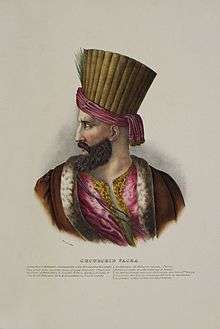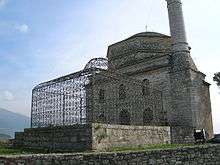Hurshid Pasha
| Hurşid Ahmed Pasha | |
|---|---|
 Friedel, 1832 | |
| Died |
30 November 1822 Larissa, Ottoman Empire |
| Allegiance |
|
| Rank | Grand Vizier |
Hurşid Ahmed Pasha[1] (died 30 November 1822) was an Ottoman general and Grand Vizier during the early 19th century.
Early life
He was born in the Caucasus and was of Georgian descent.[2][3] He was taken to Constantinople as a youth, converted to Islam and enrolled in the Janissaries. There he acquired the favour of Sultan Mahmud II and occupied several high positions.
Egypt (1801–05)
Appointed mayor of Alexandria after the French evacuated Egypt in 1801,[4] he was named governor of Egypt in 1804 at Muhammad Ali's behest. Allied with Britain's diplomatic representative, Hurshid tried to get Muhammad Ali and his Albanians removed from Egypt, bringing in the deli (lit. "madmen") light cavalry from Syria to counterbalance them. Muhammad Ali managed to win the Delis to his side and, backed by a demonstration of ulema and guild leaders in Cairo, had himself named governor of Egypt in May 1805. Hurshid, abandoned by his troops, was besieged in the Cairo Citadel, which he left only after he saw the Ottoman firman investing Muhammad Ali as Egypt's governor.
Rumelia
In 1808, Hurshid Pasha served as the governor of Rumelia.[5]
Suppression of the Serbian revolts
In March 1809, he was sent to Serbia in order to repress the revolt of Karađorđe Petrović. On 5 September 1812 he was named Grand Vizier (Prime Minister), a post he held until 1 April 1815. He remained on campaign in Serbia as commander-in-chief (serasker), and brought the uprising to an end after recapturing Belgrade in October 1813. In that year he was named governor of the Eyalet of Bosnia and from that position he campaigned with success against the Second Serbian Uprising led by Miloš Obrenović.
Suppression of Ali Pasha's revolt and Greek Revolution

In November 1820, he was named mora valisi, governor of the Morea Eyalet (the Peloponnese), with seat at Tripoli and serasker of the expedition against the rebellious Ali Pasha of Yanina. Before he left for Yanina, however, he was disturbed by rumours of a possible revolt among the Greeks of the Morea. His fears were allayed, however, when an assembly of Greek notables visited him on 8 November 1820 in Tripoli. Thus, on 6 January 1821, he left Tripoli for the north, leaving behind his treasury and his harem, while his deputy (kaimakam) Mehmed Salih with a force of 1,000 Albanians remained to maintain order. However, only a few months later, while the Ottoman armies were besieging Yanina, the first uprisings of the Greek War of Independence took place.
Hurshid immediately informed the Sultan of the events, and without waiting for instructions, reacted by sending Omer Vryonis and Köse Mehmed Pasha to suppress the revolt first in Central Greece and then to cross over to the Peloponnese and quell the uprising in its heartland. At the same time, he dispatched his chief of staff Mustafa Bey with 3,000 men to reinforce the garrison of Tripoli. Hurshid himself remained in Yanina to supervise the last stages of the siege. Despite his rapid reaction, his plans ultimately failed: Vryonis and Köse Mehmed failed to suppress the revolt in Central Greece, while the reinforcements of Mustafa Bey were insufficient to save Tripoli, which fell to the Greeks under Theodoros Kolokotronis after a prolonged siege, on 23 September 1821. Despite the general massacre of the Muslim inhabitants, Hurshid's harem and a part of his treasure were saved. Finally, in January 1822, he managed to kill Ali Pasha through treason, and sent his severed head to the Sultan, and his star seemed on the rise again. He assembled an army of 80,000 men (a huge number by Balkan standards) and was about to march in order to finally crush the Greek uprising, when disaster struck. His political enemies in Constantinople, alarmed at the fame and power he had achieved and the prestige that the successful ending of both Ali Pasha's and the Greek revolts would bring him, accused him of misappropriating a large part of Ali's treasure. Hurshid had sent 40,000,000 piasters, with a statement that they had been found in Ali's vaults, while the Sultan's ministers calculated Ali's fortune at over 500,000,000 piasters. When they asked him to send a detailed account, the offended Hurshid did not reply. Shortly after that, he was denounced for abuse of public treasure and fell in disgrace. He was removed from his positions, and replaced as serasker and mora valisi by Mahmud Dramali Pasha. Hurshid was ordered to remain in Larissa to attend to the provisioning of Dramali's army.
When news began arriving in Constantinople of the failure of Dramali's expedition at Dervenakia, the Sultan ordered Hurshid to take matters in his own hand and salvage what he could of the situation. However, his opponents continued to plot against him, and agents were sent to kill him. Although he was informed of the threat to his person, Hurshid did not react. Instead, he committed suicide by taking poison on 30 November 1822.
See also
References
- ↑ Sometimes written Ahmad Khurshid Pasha (Arabic: أحمد خورشيد باشا)
- ↑ Murat Kasap (2009-06-24). "Hurşit Ahmet Paşa". Osmanlı Gürcüleri (in Turkish). Retrieved 20 February 2011.
- ↑ İsmail Hâmi Danişmend, Osmanlı Devlet Erkânı, Türkiye Yayınevi, İstanbul, 1971, p. 71. (Turkish)
- ↑ Ahmad Fadl Shabloul. "List of governors of Alexandria (1798-2000)" (in Arabic). Retrieved 2008-08-24.
- ↑ Ali Yaycioglu (4 May 2016). Partners of the Empire: The Crisis of the Ottoman Order in the Age of Revolutions. Stanford University Press. pp. 220–. ISBN 978-0-8047-9612-5.
Sources
- Goldschmidt, A. (2000). Biographical Dictionary of Modern Egypt. American University in Cairo Press. p. 106. ISBN 978-977-424-579-4. OCLC 45089356.
| Political offices | ||
|---|---|---|
| Preceded by Muhammad Al Shurbagi Al Gheryani |
Mayor of Alexandria 1802–1803 |
Succeeded by Trabluslu Ali Pasha |
| Preceded by Trabluslu Ali Pasha |
Mayor of Alexandria 1804 |
Succeeded by Taher Bey |
| Preceded by Koca Hüsrev Mehmed Pasha |
Ottoman Governor of Egypt 16 March 1804 – 17 May 1805 |
Succeeded by Muhammad Ali Pasha as Monarch of Egypt |
| Preceded by Laz Ahmed Pasha |
Grand Vizier of the Ottoman Empire July 1812 – 30 March 1815 |
Succeeded by Mehmed Emin Rauf Pasha |